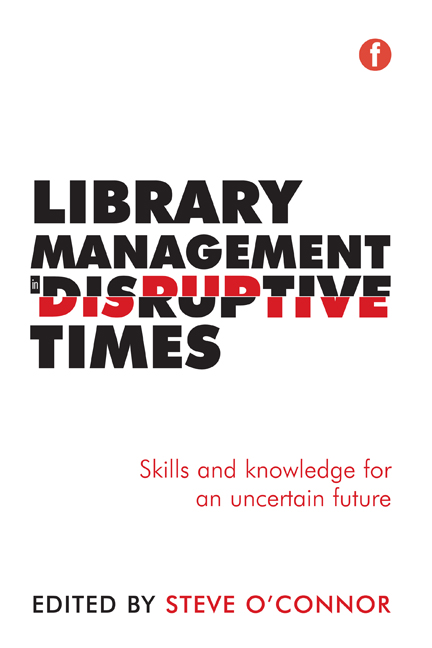Book contents
- Frontmatter
- Contents
- Contributors
- Introduction
- 1 Leading change: knowledge for success
- 2 Management fads and fashions and their impact on the LIS community
- 3 The Five Rules of Engagement for librarians: aux Ranganathan's laws of library science
- 4 Library management, disruption and consortia: an Australian example
- 5 No regrets; just lessons: economic crisis is changing our life and the management of libraries
- 6 Introducing agile principles and management to a library organization
- 7 The role of professional associations in changing times
- 8 And the walls came tumbling down ... The library profession confronts all-invasive new managerialism
- 9 What is behind the meaning of disruption? Or, thinking of management strategies from the outside
- Index
8 - And the walls came tumbling down ... The library profession confronts all-invasive new managerialism
Published online by Cambridge University Press: 08 June 2018
- Frontmatter
- Contents
- Contributors
- Introduction
- 1 Leading change: knowledge for success
- 2 Management fads and fashions and their impact on the LIS community
- 3 The Five Rules of Engagement for librarians: aux Ranganathan's laws of library science
- 4 Library management, disruption and consortia: an Australian example
- 5 No regrets; just lessons: economic crisis is changing our life and the management of libraries
- 6 Introducing agile principles and management to a library organization
- 7 The role of professional associations in changing times
- 8 And the walls came tumbling down ... The library profession confronts all-invasive new managerialism
- 9 What is behind the meaning of disruption? Or, thinking of management strategies from the outside
- Index
Summary
Introduction
In response to the editor's request to offer personal reflections on the changes in library management since the 1970s, it is important to begin by stating the author's background, and thus, what this chapter offers. The author began his career as a library assistant in a large, UK public library system in 1970. After graduating from library school he worked in a small, 13-staff college library in the 1970s with two other professionals and then moved on successively to two larger academic libraries in the UK over a period of 16 years. In 1988 the author moved to Hong Kong, and in 2000 became the University Librarian of the Chinese University of Hong Kong (CUHK), a multi-site academic library with 200 staff, four million print volumes and four million e-books. The author retired in December 2012. While Hong Kong academic libraries might at first seem exotic and unrepresentative exemplars for a discussion on library management, it should be noted that the majority of the eight publicly funded tertiary institutions in the very international Hong Kong China Special Administrative Region (SAR) are consistently listed in the Times Higher Education Supplement of the world's top 200 universities – indeed three of them are regularly in the top 40. Hitherto, the Hong Kong library environment has been a cosmopolitan melting-pot for library professionals with master's degrees and subsequent experience predominantly acquired in North America, Australasia and the UK. Generally, the abiding priorities in Hong Kong universities reflect a state-of-the-art common world-view in management, teaching, research and the now muchvaunted ‘student experience’.
This chapter is not a comprehensive discourse on management sciences or a complete recent history of management theory in libraries. Rather, it is an unapologetically personal take on the changes in management in academic libraries in public sector tertiary institutions as observed over a 40-year career. If the opinions expressed here are considered solipsistic and reductionist, so be it. At the very least, they are honest reflections born of experience. The chapter ends with some suggestions on managing continual change that would be applicable in any library sector.
- Type
- Chapter
- Information
- Library Management in Disruptive TimesSkills and knowledge for an uncertain future, pp. 119 - 140Publisher: FacetPrint publication year: 2015



